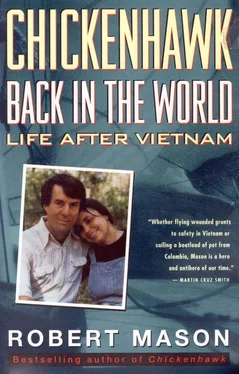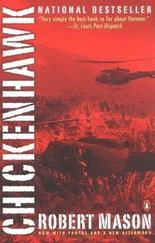Robert Mason - Chickenhawk - Back in the World - Life After Vietnam
Здесь есть возможность читать онлайн «Robert Mason - Chickenhawk - Back in the World - Life After Vietnam» весь текст электронной книги совершенно бесплатно (целиком полную версию без сокращений). В некоторых случаях можно слушать аудио, скачать через торрент в формате fb2 и присутствует краткое содержание. Год выпуска: 2013, Издательство: BookBaby, Жанр: Старинная литература, на английском языке. Описание произведения, (предисловие) а так же отзывы посетителей доступны на портале библиотеки ЛибКат.
- Название:Chickenhawk: Back in the World - Life After Vietnam
- Автор:
- Издательство:BookBaby
- Жанр:
- Год:2013
- ISBN:нет данных
- Рейтинг книги:3 / 5. Голосов: 1
-
Избранное:Добавить в избранное
- Отзывы:
-
Ваша оценка:
- 60
- 1
- 2
- 3
- 4
- 5
Chickenhawk: Back in the World - Life After Vietnam: краткое содержание, описание и аннотация
Предлагаем к чтению аннотацию, описание, краткое содержание или предисловие (зависит от того, что написал сам автор книги «Chickenhawk: Back in the World - Life After Vietnam»). Если вы не нашли необходимую информацию о книге — напишите в комментариях, мы постараемся отыскать её.
Chickenhawk: Back in the World - Life After Vietnam — читать онлайн бесплатно полную книгу (весь текст) целиком
Ниже представлен текст книги, разбитый по страницам. Система сохранения места последней прочитанной страницы, позволяет с удобством читать онлайн бесплатно книгу «Chickenhawk: Back in the World - Life After Vietnam», без необходимости каждый раз заново искать на чём Вы остановились. Поставьте закладку, и сможете в любой момент перейти на страницу, на которой закончили чтение.
Интервал:
Закладка:
That night, Jay Elliott, a member of the board of directors, told me that my speech was scheduled for the big luncheon Sunday. He also said, “There might be an incident, Bob.”
“Incident? Like what?”
“Some of the guys gave us a bunch of flak about having you give a speech. You know, your smuggling thing. They said they’ll get up and leave as a group when you’re speaking.”
“So why the hell did you and Owens invite me?” I asked.
“Because I think you did a hell of a job with Chickenhawk . You made a mistake, I’m sure you know that. I just wanted you to know not everybody agrees with us so it wouldn’t take you by surprise.”
Saturday morning we loaded up in twelve buses and drove the fifty miles to Mineral Wells. The buses drove through the main gate of the former flight school. The two helicopters were gone; only their pedestals remained. Fort Wolters, former home of the U.S. Army Primary Helicopter School, was now an industrial park.
The buses parked in the drill field where we used to practice marching for endless hours. The barracks, long two-story brick buildings, were empty, abandoned on a weedy field. We got out and wandered around the buildings, remembering. You could almost hear the shouts that used to echo in the yards, “Give me twenty, candidate.” “You call that a clean belt buckle, candidate?”
Jerry and I went into a barracks, walked down a hallway, trying to find our old rooms. The building was dusty, spooky, quiet. It had once bustled with eager young men determined to become pilots. We used to spit-shine our floors and wax the sinks. We used to sit up nights in the latrines, studying for the next written test. We braced to attention and slammed against the walls when an upperclassman or, God forbid, an actual TAC officer met us in the hallways. The place never rested. Now our footsteps echoed in the emptiness.
Outside, tumbleweed drifted between the barracks.
As promised, the town gave us a party. They’d reopened the old mess hall. They served barbecue and beer, all the beer we could drink.
After lunch, we sat through a couple of hours of speeches given by former flight school instructors and the mayor, and saw a movie describing the opportunities of starting a business in the industrial park.
When a speaker asked someone to stand up at the back of the audience, the man in front of me turned around. It was Woody Woodruff. I called him Decker in Chickenhawk . He and Captain Phillips (Morris in the book) were shot down when Phillips, Woody’s best friend, was shot through the heart during an assault landing in Happy Valley. I’d gotten caught in the same ambush, gotten shot down, but didn’t get a scratch.
“Mason!” Woody said, beaming.
“Woody!”
Jerry, sitting beside me, said the same thing. We hadn’t seen each other since Vietnam. After the meeting, we traded addresses with Woody and got back on the buses for a tour of Mineral Wells before heading back to Fort Worth.
The buses looped around this small Texas town and our guide, a local volunteer, pointed out the new library and showed us that the old hotel was closed. In the country outside of town he pointed at some buffalo grazing in a field, said ranching buffalo was a burgeoning industry in this part of Texas. The truth was, when the flight school closed, Mineral Wells shriveled up and became the small central Texas town it had been before the Army arrived in the fifties.
The train of buses stopped at the Holiday Inn on the way out of town. Here, two rotor blades were set up as an arch at the entrance to the pool. In the days after Jerry and I graduated, the new pilots were thrown into this pool when they first soloed, not in the cattle ponds like we’d been. More beer was available, as much as you could drink. Soon people were throwing one another into the pool. After a couple hours of play, the pilots, many dripping wet, boarded the buses for the trip back to the city.
When one of the other buses passed us on the highway, everybody in our bus booed and demanded the driver catch them. Who knows why? The driver ignored us. Finally one of the pilots walked up to the front of the bus and held out fifty dollars saying, “You beat these other assholes back to town and you get this.”
The driver sped up and the race was on.
One bus passed us on a downhill run, and we saw two forty-year-old men with their naked butts pressed up against the windows. Everybody was laughing. Patience and Martie were giggling. One guy yelled “Pressed ham!” Martie yelled “I’m in love!” It was crazy, it was juvenile, it was fun.
The pilots raced and mooned each other all the way to Fort Worth, prompting calls to the police from offended motorists. The police called the hotel and were informed by the manager, “That’s impossible. These men are all over forty!”
When we got back to the hotel, the drivers were all given their prizes, for being good sports and for giving it their best.
I woke up early Sunday morning wondering what I was going to say in the speech. I’d given talks at universities, but those were usually about Vietnam and helicopters in combat. What could I tell these guys about that? Also, I knew there was going to be some kind of demonstration.
I decided to write a short story about our trip to Mineral Wells. I spent a couple of hours at it and it seemed like it would probably work, though I suspect you would have had to have been there to appreciate it. I still didn’t know how I was going to handle the protesters.
Jerry and Martie Towler and Patience and I sat at a table near the dais. Dave Owens, who was sitting with us, leaned over and said, “You know what you’re going to say?”
“Yeah, pretty much.”
“Bob, I want you to do me a favor and not get mad.”
“What’s that, Dave?”
“Show me your notes when you come up to the dais, just a glance.”
“What for?”
“Because that was one of the conditions for you speaking here. They said I had to see your notes before you speak.”
“That’s bullshit, Dave.”
“I know. I won’t read them. Hold them up when you walk by me. That’s looking at them, isn’t it?”
I laughed. “Sure, okay.”
Dave went to the podium, made a few brief announcements, and then introduced me.
As we passed each other on the steps, I held my notes out to Dave, who looked at them and then out at the audience. He nodded and said, “Thanks, Bob. Give’m hell.”
I turned on my pocket tape recorder, put my notes, my story, on the podium. There were over a thousand people in the room. The applause was thunderous. I waited.
I said:
“I thank you for inviting me to be your speaker today. I feel kind of odd about that. I’m a member of the organization; I’m not from outside.
“I’m here because I wrote a book about what I, and many of us, did in Vietnam, and subsequently gained some celebrity because of it.
“I feel odd about that, too, because almost anybody here could have written Chickenhawk . Many of you certainly experienced more harrowing adventures than I did. But I’m the one who wrote the book.” I paused. “I’m the one that’s getting the recognition,” I said quietly. I looked across the audience.
“I’m the one who gets the letters.”
“I get letters from grunts thanking me for having been a helicopter pilot in Vietnam.
“They thank me for the pilot who pulled them out of a hot LZ and saved their lives.
“They thank me for the pilot who got the Huey in, at night, without lights, under fire, bringing in ammunition and supplies that saved their unit.
“They thank me for the things we all did in Vietnam.
“Being, I suppose, the more well-known of the Vietnam pilots here, the one who gets the mail, the one who gets the attention we all deserve, I hereby pass that thanks on to you.” I stood back, held up my arms, and said, “You deserve it. Give yourself a hand.”
Читать дальшеИнтервал:
Закладка:
Похожие книги на «Chickenhawk: Back in the World - Life After Vietnam»
Представляем Вашему вниманию похожие книги на «Chickenhawk: Back in the World - Life After Vietnam» списком для выбора. Мы отобрали схожую по названию и смыслу литературу в надежде предоставить читателям больше вариантов отыскать новые, интересные, ещё непрочитанные произведения.
Обсуждение, отзывы о книге «Chickenhawk: Back in the World - Life After Vietnam» и просто собственные мнения читателей. Оставьте ваши комментарии, напишите, что Вы думаете о произведении, его смысле или главных героях. Укажите что конкретно понравилось, а что нет, и почему Вы так считаете.












